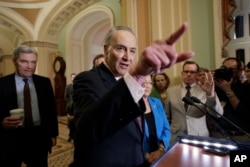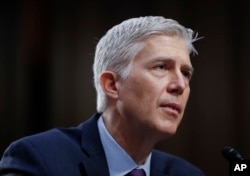Senate Democrats on Tuesday doubled down in their efforts to block President Donald Trump's Supreme Court pick, and Republicans hardened their resolve to use any means necessary, including changing Senate rules, to overcome a filibuster.
Majority Leader Mitch McConnell, a Kentucky Republican, said Democrats had "brought the Senate to a new low" by insisting on a three-fifths majority vote to cut off debate and move to a final vote on Neil Gorsuch, an appellate judge who would fill the Supreme Court vacancy created by the death last year of Justice Antonin Scalia.
With at least 41 Democrats opposing Gorsuch in the 100-member body, Republicans would be unable to overcome the filibuster when they move to end floor debate on the conservative jurist this week.
Senate tradition
McConnell, who made clear his majority party would change the Senate rules to overcome the filibuster roadblock, accused Democrats of obliterating a Senate tradition of bipartisan backing for Supreme Court nominees.
"No one in the Senate Republican conference — no one — has ever voted to filibuster a Supreme Court nominee. Not one Republican has ever done that," the majority leader said. "When President [Barack] Obama nominated [liberal justices] Sonia Sotomayor and Elena Kagan, I led my party in working to ensure that they received an up-or-down vote, not a filibuster."
Democrats responded with derision, noting that Republicans refused to consider Obama's final Supreme Court nominee, Merrick Garland, last year.
"The name he [McConnell] forgot to mention was Merrick Garland," said Democratic Senator Dick Durbin of Illinois. "Merrick Garland, the only presidential nominee to the Supreme Court in the history of the United States Senate to be denied a hearing and a vote."
"What the majority leader did to Merrick Garland by denying him even a hearing and a vote is even worse than a filibuster," said Minority Leader Chuck Schumer, a New York Democrat.
In coming days, Republicans are widely expected to use their majority to change the rules that govern the Senate and eliminate the filibuster for Supreme Court nominees. They would then confirm Gorsuch with a simple majority vote. That move has been called the "nuclear option," as it would change the nature of a chamber that historically has afforded considerable sway to the minority party.
'All they know is to obstruct'
Republicans said Democrats were forcing their hand.
"If Judge Gorsuch is an unacceptable nominee, can you imagine any nominee by this president being acceptable to our Democratic colleagues?" asked Republican Senator John Cornyn of Texas. "I can't, because Judge Gorsuch is about as good as you get."
"They [Democrats] have dragged their feet on every Cabinet nomination, and now the Supreme Court nomination. All they know is to obstruct, because they haven't gotten over the fact that Hillary Clinton isn't president of the United States," Cornyn added.
Democrats have a different reading of history.
"We shouldn't be entertaining Neil Gorsuch this week; we should be celebrating the first anniversary of Merrick Garland's service on the U.S. Supreme Court," Durbin said.
"No one is forcing Senator McConnell to change the rules. He's doing it at his volition, just as he prevented Merrick Garland from getting a vote at his own volition," Schumer said.
Previous rule change
Democrats themselves changed Senate rules in 2013, when they controlled the chamber, to overcome persistent Republican filibusters of Obama nominees. Democrats eliminated the filibuster for all nominees other than Supreme Court picks, and did so over the fierce objections of Republicans at the time.
Just as Democrats demanded Republicans end the filibuster in 2013, so did Republicans on Tuesday.
"It's not too late for our friends [Democrats] to do the right thing," McConnell said. "The future of the Senate will hang on their choice."






